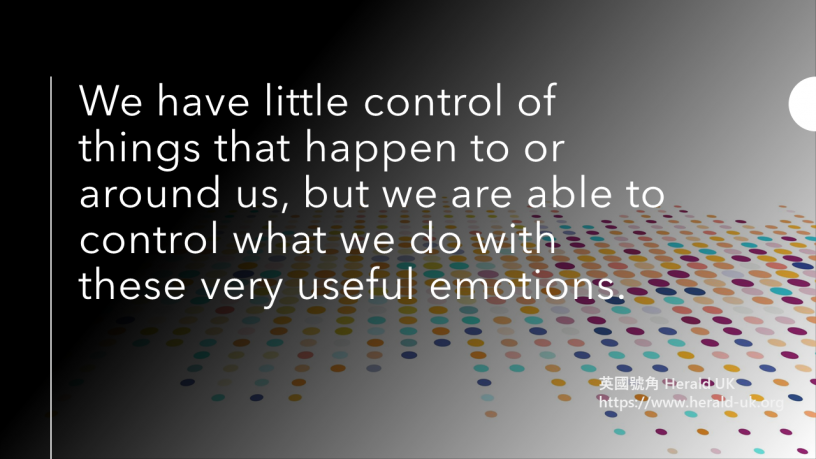Wynne C
Life is unpredictable. Despite meticulous planning, we never truly know what will happen in the next second. We always welcome a pleasant surprise whether it be winning a prize, receiving a gift or being complimented by your boss. On the other hand, we are less thrilled when we are met with difficult circumstances, such as a punctured tyre, a complaint from a customer or an end to a relationship.
Whatever the situation we are faced with, we usually respond with an array of emotions. We may feel angry about a backhanded comment from a colleague, excited about winning a free holiday abroad, frustrated about being late to work because of traffic or shocked about the death of a close friend.
There is no right or wrong emotion to feel in any given situation. Our emotions are simply a response to an external trigger which tells us an important message about our internal thoughts. We have little control of things that happen to or around us, but we are able to control what we do with these very useful emotions.
When we start to dig deeper into the reasons behind our emotions, we learn so much more about ourselves and in doing so, also learn to process our emotions in a healthy way to our advantage.
I remember having a very bad day a few weeks ago at the GP practice I work at. At the end of a very busy, overrun morning clinic, I was looking forward to having a short lunch break before my afternoon clinic. I was then informed that a patient had passed away at home and I was asked to visit to certify his death. I instantly felt disappointed that I would not have time for lunch. After returning from this visit, I completed all the documentation on paper, only to be told I needed to redo it on the computer. By that point, I went into my office and absolutely lost my cool. I threw all the paperwork on the floor out of frustration. I blamed the colleague who asked me to visit this patient, and I was angry at the member of staff who told me to redo the documentation. I had allowed disappointment, anger and frustration to regrettably affect my entire afternoon. I was impatient, unproductive and all in all miserable. In the evening I reflected on the day, and realised that I had allowed myself to become a very bitter, unpleasant person simply because of the unmet expectation of not having time for lunch. I learnt that I was reluctant to say “no” or “wait” when given a task because of my people-pleasing nature. I developed a better understanding of how irritable I can be when I am hungry. I decided that choosing to have a quick lunch first before attempting any other tasks could help avoid a very miserable day.
The emotions we have are symptoms of our inner thoughts and very often reflect our view of ourselves and of those around us. We should never be made to feel guilty or ashamed about having negative emotions. If we do not allow ourselves to face these emotions and process the reasons behind them, we are missing the opportunity to understand ourselves better as well as learn how to avoid making the same mistakes over and over again.
Life is unpredictable and we do not have control over many things. What we do have control over is how we choose to respond and whether we allow difficult circumstances to influence our inner thoughts, which ultimately shapes who you are as a person and how you view the world. So next time you find yourself starting to blame a person or situation for your actions, take a pause and remind yourself who is in control.











